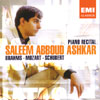Brahms; Mozart; Schubert Piano Sonatas
Mozart pricks up the ears but you’re soon aware of a debut artist’s inhibitions
View record and artist detailsRecord and Artist Details
Composer or Director: Wolfgang Amadeus Mozart, Johannes Brahms, Franz Schubert
Genre:
Instrumental
Label: Début
Magazine Review Date: 2/2006
Media Format: CD or Download
Media Runtime: 63
Mastering:
Stereo
DDD
Catalogue Number: 5870102

Tracks:
| Composition | Artist Credit |
|---|---|
| Sonata for Piano No. 18 |
Wolfgang Amadeus Mozart, Composer
Saleem Abboud Ashkar, Piano Wolfgang Amadeus Mozart, Composer |
| Sonata for Piano No. 14 |
Franz Schubert, Composer
Franz Schubert, Composer Saleem Abboud Ashkar, Piano |
| (25) Variations and Fugue on a Theme by G.F. Handel |
Johannes Brahms, Composer
Johannes Brahms, Composer Saleem Abboud Ashkar, Piano |
Author: Bryce Morrison
Saleem Abboud Ashkar is a 29-year-old Nazareth-born pianist whose first disc in EMI’s ‘Debut’ series consists of familiar and substantial musical fare. His Mozart is fluent and mature, and includes a finely poised central Adagio, making you quickly abandon pen and paper and listen in admiration.
Alas, I wish I could be similarly enthusiastic about his Schubert and Brahms. Here, diffidence and generalisation are slim alternatives to greater character and stylistic awareness. I do not ask for an idiosyncratic or interventionist view but Ashkar’s studio-bound reading surely reflects too little of Schubert’s bleakness and audacity, of music where, to quote Thomas Nashe, ‘brightness falls from the air’.
The Brahms Variations are even more inhibited. True, Ashkar is resilient and outgoing in Var 1, resolute and energetic, as marked, in Vars 4 and 10, and he brings the heaven-storming fugue to a suitably exultant close. But he is much less beguiling in lyricism, lacking piquancy and charm in Vars 17, 19 and 22, missing the vivacita cross-accentuation in Var 7 and starting Var 23 with a resounding forte when it is marked piano. EMI’s sound is excellent but the accompanying notes, with their reference to the ‘cosy’ lyricism of Schubert’s early sonatas, are superficial.
Alas, I wish I could be similarly enthusiastic about his Schubert and Brahms. Here, diffidence and generalisation are slim alternatives to greater character and stylistic awareness. I do not ask for an idiosyncratic or interventionist view but Ashkar’s studio-bound reading surely reflects too little of Schubert’s bleakness and audacity, of music where, to quote Thomas Nashe, ‘brightness falls from the air’.
The Brahms Variations are even more inhibited. True, Ashkar is resilient and outgoing in Var 1, resolute and energetic, as marked, in Vars 4 and 10, and he brings the heaven-storming fugue to a suitably exultant close. But he is much less beguiling in lyricism, lacking piquancy and charm in Vars 17, 19 and 22, missing the vivacita cross-accentuation in Var 7 and starting Var 23 with a resounding forte when it is marked piano. EMI’s sound is excellent but the accompanying notes, with their reference to the ‘cosy’ lyricism of Schubert’s early sonatas, are superficial.
Discover the world's largest classical music catalogue with Presto Music.

Gramophone Digital Club
- Digital Edition
- Digital Archive
- Reviews Database
- Full website access
From £8.75 / month
Subscribe
Gramophone Full Club
- Print Edition
- Digital Edition
- Digital Archive
- Reviews Database
- Full website access
From £11.00 / month
Subscribe
If you are a library, university or other organisation that would be interested in an institutional subscription to Gramophone please click here for further information.




